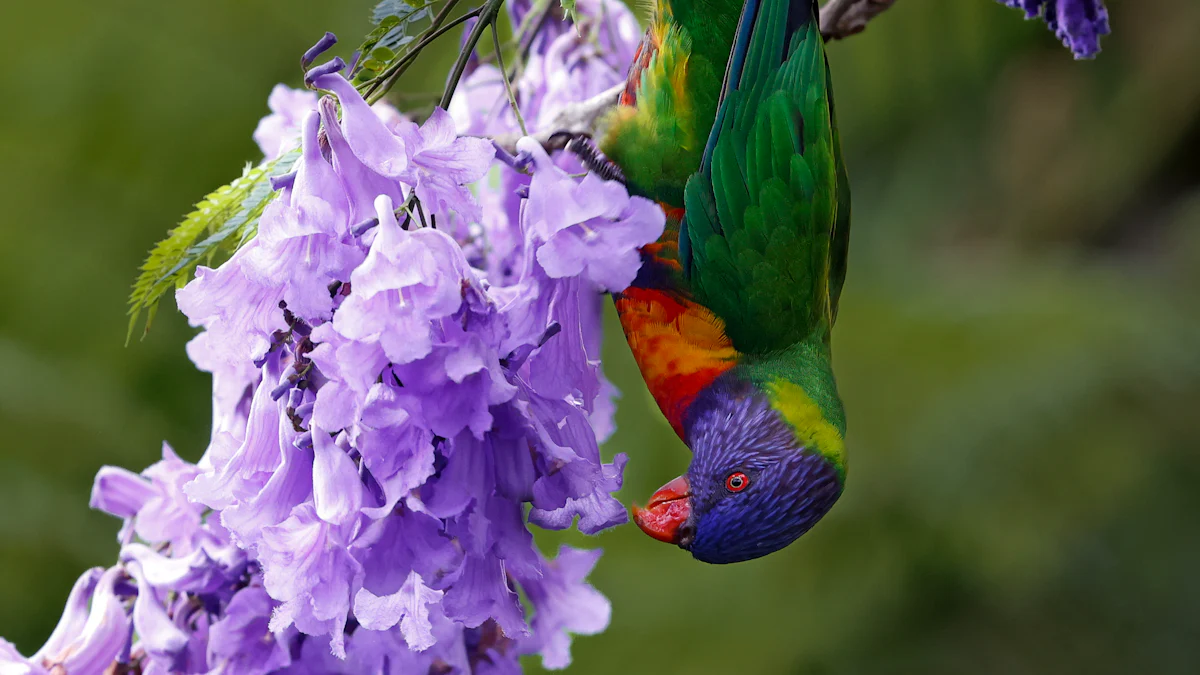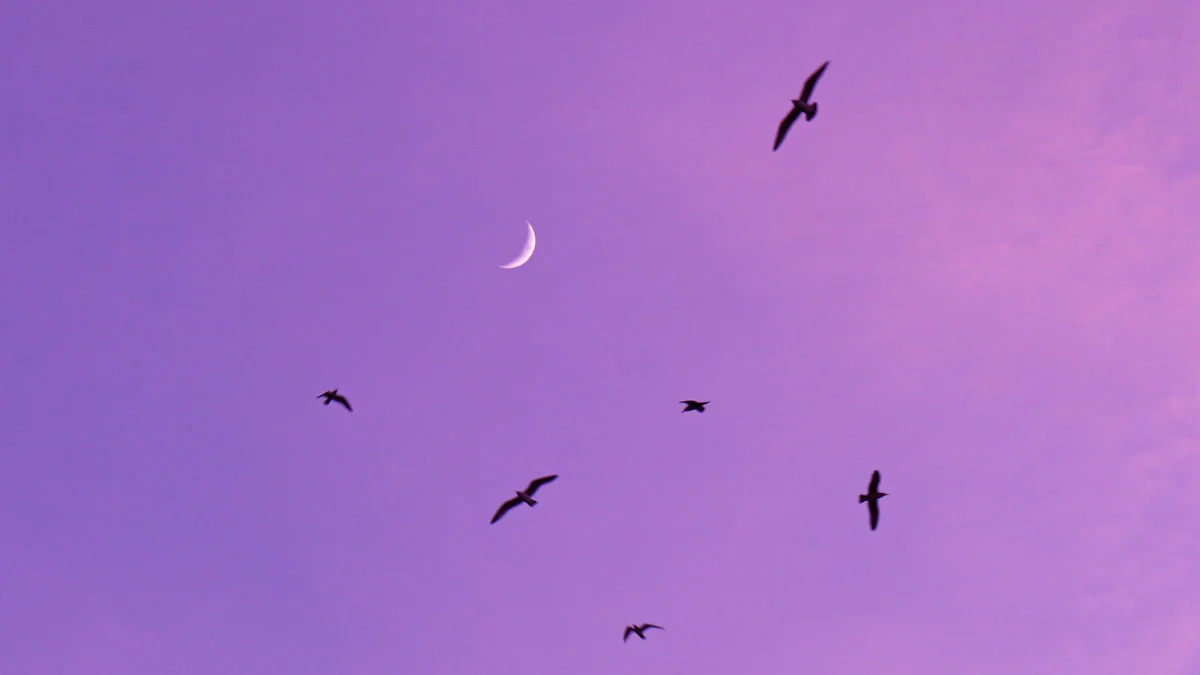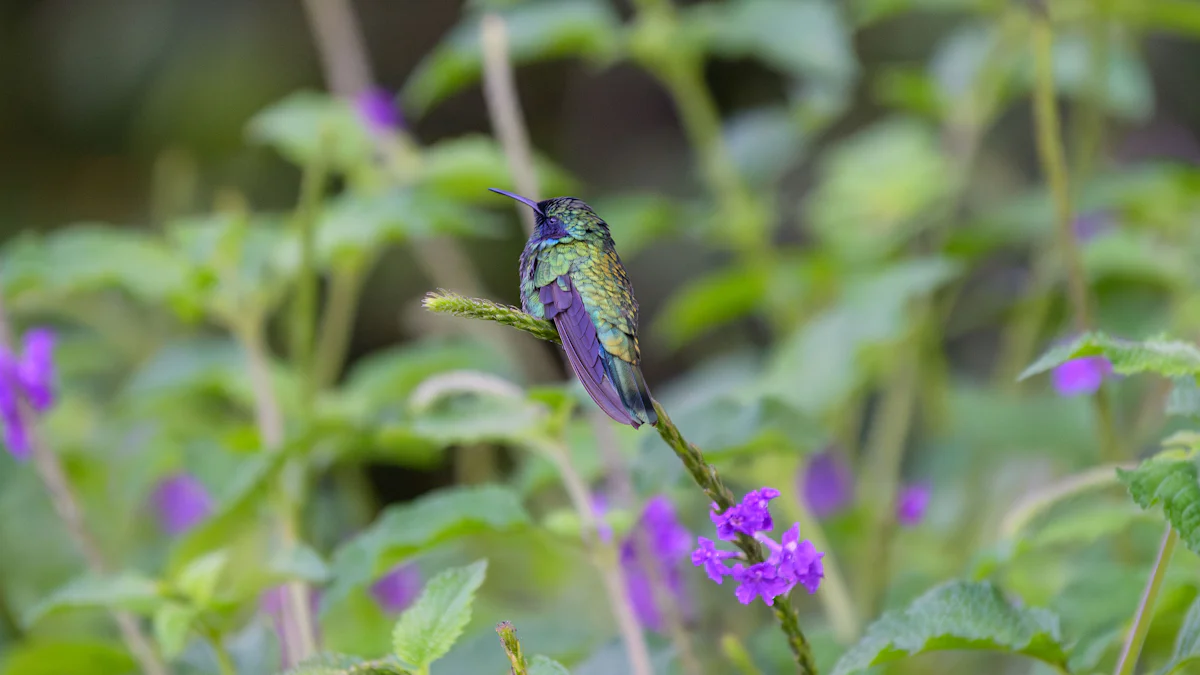
Have you ever wondered, "can bird poop be purple?" The answer lies in what birds eat. When birds feast on berries like blueberries, blackberries, or elderberries, their droppings can take on a purple hue. These fruits contain pigments called anthocyanins, which give the poop its distinctive color. Sometimes, foods with artificial dyes can also cause this change. Understanding these dietary influences helps you determine if purple poop is just a colorful side effect of a bird's meal or a sign of something more concerning.
Key Takeaways
Bird poop can turn purple primarily due to the consumption of berries rich in anthocyanins, such as blueberries and blackberries.
Artificial dyes in commercial bird food can also alter the color of bird droppings, leading to unexpected hues.
The unique avian digestive system allows pigments from food to mix with waste, resulting in colorful droppings.
While purple poop is often harmless and diet-related, persistent changes or accompanying symptoms may indicate health issues.
If you notice unusual colors in bird poop, monitor your bird's behavior and consult a veterinarian if concerns arise.
Understanding the connection between diet and poop color can help bird owners ensure their pets' health and well-being.
The Role of Diet and Pigments

Ever noticed how some bird poop turns purple? The secret lies in their diet. Let's dive into how what birds eat can paint their droppings in vibrant hues.
Berries and Natural Dyes
Common berries that influence poop color
Birds love berries, and these juicy treats can dramatically change the color of their droppings. When birds munch on blueberries, blackberries, or elderberries, their poop often turns purple. These berries are rich in pigments called anthocyanins, which are responsible for the striking color. You might spot this colorful phenomenon in bird species that poop purple, like Cedar Waxwings or American Robins, who frequently feast on these fruits.
How natural pigments affect poop color
Natural pigments in berries don't just add color to the fruit; they also pass through the bird's digestive system, tinting the poop. Anthocyanins, the pigments found in many berries, are water-soluble and can easily mix with the bird's waste. This process explains why bird poop can be purple after a berry-rich meal. It's a fascinating example of how diet directly influences the appearance of bird droppings.
Artificial Dyes in Bird Food
Types of artificial dyes found in bird food
Not all colorful bird poop comes from natural sources. Some commercial bird foods contain artificial dyes to make them more appealing. These synthetic colors can also affect the color of bird droppings. You might find dyes like Red 40 or Blue 1 in birdseed mixes, which can lead to unexpected hues in the poop.
Impact of artificial dyes on poop color
Artificial dyes work similarly to natural pigments. They pass through the bird's digestive system and can alter the color of the waste. While these dyes are generally safe, they can cause bird poop to appear in shades not typically seen in nature. If you notice unusually bright or varied colors in bird droppings, consider whether artificial dyes might be the culprit.
Understanding the factors that influence bird poop color helps you appreciate the connection between a bird's diet and its droppings. Whether it's the natural pigments from berries or the synthetic hues from commercial foods, these elements play a significant role in the colorful world of bird poop.
The Bird Digestive Process

Understanding how birds digest their food can shed light on why bird poop sometimes turns purple. Let's explore the fascinating journey of food through a bird's body and how it affects the color of their droppings.
How Birds Digest Food
Overview of the avian digestive system
Birds have a unique digestive system that processes food quickly and efficiently. When a bird eats, the food travels from the beak to the crop, where it gets stored temporarily. From there, it moves to the stomach, which consists of two parts: the proventriculus and the gizzard. The proventriculus secretes digestive enzymes, while the gizzard grinds the food, often with the help of ingested stones. This efficient system allows birds to extract nutrients rapidly, which is crucial for their high-energy lifestyles.
How digestion affects waste color
The color of bird poop is influenced by what they eat and how their digestive system processes it. As food passes through the digestive tract, pigments from the diet, like anthocyanins found in berries, can mix with the waste. This interaction can result in colorful droppings. For instance, when birds consume berries rich in these pigments, their poop may turn purple. The digestive process doesn't alter the pigments significantly, allowing them to retain their vibrant hues in the waste.
The Role of Uric Acid
Explanation of uric acid in bird waste
Birds excrete waste differently than mammals. Instead of producing urine, they excrete uric acid, which is a white, paste-like substance. This adaptation helps conserve water, an essential feature for many bird species. Uric acid combines with fecal matter in the cloaca, the final chamber of the digestive tract, before being expelled as bird poop.
Interaction with pigments to create color
Uric acid itself is white, but when it mixes with pigments from the bird's diet, it can create a range of colors in the droppings. For example, when a bird eats berries high in anthocyanins, these pigments interact with the uric acid, resulting in purple bird poop. This colorful transformation highlights the direct impact of diet on the appearance of bird waste.
By understanding the bird digestive process, you gain insight into why bird poop can vary in color. The combination of a bird's diet and its unique way of processing food plays a significant role in creating those unexpected hues. So next time you spot purple bird poop, you'll know it's a colorful testament to the bird's recent meals.
Health-Related Causes of Purple Poop
While purple bird poop often results from dietary choices, sometimes it signals health concerns. Knowing when to worry can help you ensure your feathered friend's well-being.
When to Be Concerned
Signs that purple poop may indicate a health issue
You might wonder, "can bird poop be purple for reasons other than diet?" Yes, it can. If purple poop persists beyond a few days or appears alongside other symptoms like lethargy or loss of appetite, it could indicate a problem. Avian veterinarians suggest that unusual color changes in bird poop, such as persistent purple hues, might point to underlying health issues.
Common health problems associated with color changes
Several health conditions can cause purple poop. Liver dysfunction is one possibility. The liver plays a crucial role in processing waste, and if it malfunctions, pigments might not break down properly, leading to unusual colors. Digestive tract irritation, possibly from inflammation or infection, can also result in purple poop. Parasitic or bacterial infections might disrupt digestion, causing odd-colored droppings as the body struggles to maintain normal processes. If you notice these color changes, it's wise to monitor your bird closely.
Consulting a Veterinarian
When to seek professional advice
If your bird's purple poop doesn't resolve quickly or is accompanied by other worrying signs, consulting a veterinarian is essential. Experts emphasize the importance of timely intervention. A vet can help determine whether the color change is due to diet or a more serious issue.
Diagnostic tests and treatments
When you visit the vet, they might perform diagnostic tests to pinpoint the cause of the color change. These tests could include blood work, fecal analysis, or imaging studies. Depending on the findings, the vet will recommend appropriate treatments. Some conditions, like infections, are treatable, while others might require ongoing management. Bringing a sample of the bird poop to the vet can aid in diagnosis.
Understanding when purple bird poop is a cause for concern helps you take proactive steps in caring for your bird. By staying vigilant and seeking professional advice when needed, you can ensure your feathered companion stays healthy and happy.
Purple bird poop often results from dietary choices, like consuming berries or foods with artificial dyes. This colorful change is usually harmless and temporary. By understanding the bird's diet and digestive process, you can identify why purple poop appears. However, if you notice persistent purple poop or other symptoms, it's wise to consult a veterinarian. They can help determine if there's a health issue at play. Remember, while purple poop might seem unusual, it often reflects what the bird recently ate rather than a cause for concern.
FAQ
Can bird poop color indicate health issues in birds?
Yes, it can. The color and consistency of bird poop often reflect the bird's health. If you notice changes in color or texture, it might signal underlying health issues that need attention. Keep an eye out for persistent changes and consult a vet if you're concerned.
Why is bird poop white?
Bird poop appears white because of uric acid. Birds produce uric acid as part of their digestion process, which serves as the urine component. This adaptation helps them conserve water, making the white part of their droppings quite normal.
Does all bird poop color change indicate a health problem?
Not necessarily. Different foods can change the color of your bird's poop without indicating a health issue. For example, berries can turn droppings purple. However, if the color change persists or is accompanied by other symptoms, it's wise to consult a veterinarian.
What should I do if my bird's poop changes color?
First, consider recent dietary changes. If your bird has eaten foods with strong pigments, like berries, this might explain the color change. If the change persists or other symptoms appear, seek advice from a veterinarian to rule out health concerns.
How can I tell if my bird's poop color is due to diet or health issues?
Observe the duration and accompanying symptoms. If the color change is temporary and follows a meal with colorful foods, it's likely diet-related. Persistent changes, especially with symptoms like lethargy, may indicate health issues. Consulting a vet can provide clarity.
Is purple bird poop common?
Purple bird poop is common when birds consume berries rich in anthocyanins. It's a natural result of their diet and usually not a cause for concern. However, if you're unsure, monitoring your bird's behavior and consulting a vet can help.
Can artificial dyes in bird food affect poop color?
Yes, artificial dyes in bird food can alter poop color. These dyes pass through the digestive system and may result in unexpected hues. If you notice bright or unusual colors, consider whether your bird's food contains artificial dyes.
Should I be worried if my bird's poop is purple?
In most cases, purple poop results from dietary choices, like eating berries. It's usually harmless and temporary. However, if the color persists or other symptoms arise, consulting a veterinarian is advisable to ensure your bird's health.
In conclusion, the fascinating phenomenon of purple bird poop highlights the incredible ways in which nature interacts with our environment. Understanding these unique occurrences not only enriches our bird-watching experience but also connects us more deeply with the avian world. If you’re eager to enhance your birding adventures, check out our innovative smart bird feeders. They’re designed to attract a variety of birds, making your backyard a vibrant hub of activity. Explore our products today and take your bird-watching experience to the next level!













